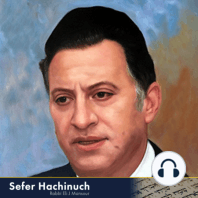20 min listen
Misva #25: Belief in G-d
FromSefer Hachinuch
ratings:
Length:
20 minutes
Released:
Aug 30, 2021
Format:
Podcast episode
Description
The Ten Commandments begin with the pronouncement, “I am Hashem your G-d who has taken you from the land of Egypt, from the house of bondage” (Shemot 20:2). According to the Rambam and Sefer Ha’hinuch, this verse establishes the obligation to believe in the existence of one G-d. In truth, the Sefer Ha’hinuch writes that the belief in the existence of a single Divine Being constitutes just one of several aspects of this Misva. This Misva obligates us to believe also that G-d created everything in existence, and that He has always existed and always will exist. Additionally, the Torah commands us to believe that G-d is the One “who has taken you from the land of Egypt” – that all the miracles of the Exodus were not accidental, but were rather wrought by G-d. And thus this Misva includes the belief in Hashgaha – providence, that G-d governs and controls everything in the world. Furthermore, the Sefer Ha’hinuch writes, this Misva requires us to belief that G-d has no physical properties, and that He is perfect, without any deficiencies. The Sefer Ha’hinuch describes this Misva as “Yesod Ha’dat” – “the foundation of the religion,” such that one who denies this belief is considered a heretic and has no share in the merits and rewards that the Jewish Nation receive. Moreover, the Sefer Ha’hinuch adds, one must be willing to surrender his life rather than renounce this belief. If gentiles order a Jew at the threat of death to deny any of these principles of our faith, one must refuse and forfeit his life for this belief. This Misva, of course, is binding upon both men and women, and is applicable at all times. It is a “Misva Temidit” – a Misva that is binding upon us constantly, at every moment of every day. Throughout our lives, we are bidden to believe in the existence of one G-d and the other beliefs mentioned above. Although the Rambam and Sefer Ha’hinuch count this command as one of the Torah’s 613 Misvot, a number of other Rishonim disagreed. These include the Behag (Ba’al Halachot Gedolot – Rav Shimon Kayara, 9 th century) and Rav Saadia Gaon (882-942), both of whom omit this command from their listings of the Misvot. The Ramban (Rav Moshe Nahmanides, Spain, 1194-1270), in his critique of the Rambam’s listing of the Misvot, supports the Behag’s view, explaining that the belief in G-d is not a Misva, but rather a prerequisite to the Misvot. The Misvot are the laws issued by the King, the Ramban writes, and they are directed only to those who acknowledge the King’s existence and His authority to issue commands. Therefore, in the view of these Rishonim, we cannot regard belief in G-d as a Misva, because the very concept of a Misva, a binding command, presupposed the belief in a Supreme Being to whose authority we are bound. According to this opinion, the belief in G-d precedes the Misvot, and thus cannot be counted as one of the Misvot. And, as many have noted, G-d did not formulate a command to believe in Him. “I am Hashem your G-d who has taken you from the land of Egypt” is a statement of fact, not a command. Therefore, these Rishonim maintain, while this belief is, of course, critically important, and forms the basis and foundation of all Jewish belief, it should not be counted as one of the Torah’s 613 Misvot. According to the Rambam and Sefer Ha’hinuch, however, belief in Hashem indeed constitutes a Misva, which means that every time we contemplate in our minds G-d existence, we are credited with the fulfillment of a Biblical command. A number of writers addressed the question of why no Beracha is recited over the fulfillment of this Misva. Just as we recite a Misva before performing other Misvot, why did the Sages not similarly ordain that we recite a Beracha before thinking about the existence of G-d? Four answers have been given to answer this question. The Or Zarua (Rav Yishak of Vienna, 1200-1270) explained that the purpose of reciting a Beracha before performing a Misva is to express “Habibut” – our love and affection
Released:
Aug 30, 2021
Format:
Podcast episode
Titles in the series (100)
Misva #19: The Prohibition Against Eating Hametz on Pesach: Daily Sefer Hachinuch - Brought to you by itorah.com by Sefer Hachinuch
